Best Version Control Systems
The top version control systems include GitHub, GitLab, Azure DevOps Server, IBM Rational ClearCase, and AWS CodeCommit. Best version control software detects code changes and adapts software to meet system requirements.



No Cost Personal Advisor
List of 20 Best Version Control System
Category Champions | 2024
Best Version Control Software
Jira is a complete version control software for long-term to change a history of each file and especially importantly working effective with legacy code. Version control system is a category of software tools that help software team managing changes to source code of over time. Read Jira Reviews
Explore various Jira features, compare the pricing plans, and unlock the potential of seamless operations by selecting the right software for your business.
Features
View all Jira Features- Task Management
- Bug Tracking
- Data Imports/Exports
- Time Tracking
- Status Tracking
- Project Planning
- Discussion Boards
- Collaboration
Pricing
Free
$ 0
Per Month
Standard
$ 8
Per Month
Premium
$ 15
Per Month
Jira Caters to
- StartUps
- SMBs
- Agencies
- Enterprises
Contenders | 2024
System by GitHub, Inc
GitHub Version Control System is a software helps to work together and maintain a completed history of work. It has files, are saved, edited and can jump to anyway moment in time in version control software. Read GitHub Reviews
Explore various GitHub features, compare the pricing plans, and unlock the potential of seamless operations by selecting the right software for your business.
Features
View all GitHub Features- Process Management
- Access Controls
- Document Storage
- Tracking Features
- Records Management
- User Access Controls
- Backup System
- API Integration
Pricing
Personal
$ 7
Per Month
Enterprise
$ 21
Per Month
GitHub Caters to
- StartUps
- SMBs
- Agencies
- Enterprises
Contenders | 2024
Innovative Version Control System
Ensure Your Valuable Work Is Protected By Automatically Storing Incremental Copies Of Your Office Document When & Where You Choose. Give Your Office Document The Priority It Deserves with this version control software. Read BackUp Xplorer Reviews
Explore various BackUp Xplorer features, compare the pricing plans, and unlock the potential of seamless operations by selecting the right software for your business.
Features
View all BackUp Xplorer Features- Encryption
- Backup System
- Customization
- Cross Platform
- Tracking Features
- Backup
- Version Control
- Document Storage
Pricing
Perpetual License
$ 39
2 User Licenses
BackUp Xplorer Caters to
- StartUps
- SMBs
- Agencies
- Enterprises
Category Champions | 2024
Smart Version Control System
LogicalDoc is a complete Version Control Management System for Small to Large enterprise businesses. It is an integration of automatic to manages each version control of document as enters LogicalDOC. Read LogicalDOC Reviews
Explore various LogicalDOC features, compare the pricing plans, and unlock the potential of seamless operations by selecting the right software for your business.
Features
View all LogicalDOC Features- Applications Management
- Automatic Notifications
- Mobile Access
- Optical Character Recognition
- Forms Management
- Secure Preview
- Email Management
- Access Controls/Permissions
LogicalDOC Caters to
- StartUps
- SMBs
- Agencies
- Enterprises
Contenders | 2024
System by Git
Git is a free and open source distributed version control system. Helpful to everything from small to very large projects with speed and efficiency. Git is fast all operations are performed locally, giving it a huge speed advantage on centralized systems. Read git Reviews
Explore various git features, compare the pricing plans, and unlock the potential of seamless operations by selecting the right software for your business.
Features
View all git Features- Activity Tracking
- Tracking Features
- Reporting
- Lifecycle Management
- History Tracking
- Version Control
- Knowledge Base
- Records Management
git Caters to
- StartUps
- SMBs
- Agencies
- Enterprises
Emergents | 2024
System by Perforce
Helix is one of the best version control system. This provides the unified platform for collaborative development and protection of any type of intellectual property. It supports for both distributed and centralized development workflows. Read Helixcore Reviews
Explore various Helixcore features, compare the pricing plans, and unlock the potential of seamless operations by selecting the right software for your business.
Features
View all Helixcore Features- Document Management
- Version Control
- Dashboard
- Security Management
- Email Notifications
- Applications Management
- Customization
- Access Controls
Helixcore Caters to
- StartUps
- SMBs
- Agencies
- Enterprises
Emergents | 2024
System by Canonical Ltd
Bazaar is a version control system software that helps track project history over time and to collaborate easily with others and recover from accidental deletions. You can restore the latest file version checked into version control software. Learn more about Bazaar
Explore various Bazaar features, compare the pricing plans, and unlock the potential of seamless operations by selecting the right software for your business.
Features
View all Bazaar Features- User Access Controls
- Backup System
- Employee Management
- Multi Location
- Multiple Workflows
- Search Functionality
- Document Storage
- Version Control
Bazaar Caters to
- StartUps
- SMBs
- Agencies
- Enterprises
Emergents | 2024
System by Codice Software
Plastic SCM is a version control system that helps your project needs branch, merge and diff easily with friendly and powerful GUI tools designed and developed for coders and artists. Learn more about Plastic SCM
Explore various Plastic SCM features, compare the pricing plans, and unlock the potential of seamless operations by selecting the right software for your business.
Features
View all Plastic SCM Features- Project Tracking
- Customization
- Knowledge Base
- Applications Management
- Version Control
- Document Storage
- Reporting
- Multiple Workflows
Pricing
Free
$ 0
month
Cloud Edition
$ 7
month
Enterprise Edition
$ 23
user/month
Plastic SCM Caters to
- StartUps
- SMBs
- Agencies
- Enterprises
Emergents | 2024
System by CollabNet, Inc.
Subversion is an open source version control software application. Version Control System (VCS) is a software that helps software developers to work together and maintain a complete history of their work. Learn more about Subversion
Explore various Subversion features, compare the pricing plans, and unlock the potential of seamless operations by selecting the right software for your business.
Features
View all Subversion Features- Process Management
- Tracking Features
- Cheap Local Branching
- History Tracking
- Records Management
- Inventory Management
- Security Management
- Access Controls
Subversion Caters to
- StartUps
- SMBs
- Agencies
- Enterprises
Emergents | 2024
System by Wildbit LLC
The Beanstalk version control software is a very simple to manage user access for individual branches. The customer data for all types of accounts are accessed by the secure protocol like as HTTPS and SSH. Learn more about beanstalk
Explore various beanstalk features, compare the pricing plans, and unlock the potential of seamless operations by selecting the right software for your business.
Features
View all beanstalk Features- Workflow Management
- Customization
- Inventory Management
- Business intelligence (BI)
- Accounting Integration
- Access Controls
- Compliance Management
- Work order management
Pricing
Bronze
$ 15
Per Month
Silver
$ 25
Per Month
Gold
$ 50
Per Month
beanstalk Caters to
- StartUps
- SMBs
- Agencies
- Enterprises
Emergents | 2024
System by Fossil
Fossil Version Control System is a multiple developing on the same project and simple & does not ambiguous communication between developers. A single file contains all history version controls of all types of files in the project. Learn more about Fossil
Explore various Fossil features, compare the pricing plans, and unlock the potential of seamless operations by selecting the right software for your business.
Features
View all Fossil Features- Web Deployment
- Tracking Features
- Document Storage
- Reporting
- Inventory Management
- Work order management
- Backup System
- Dashboard
Fossil Caters to
- StartUps
- SMBs
- Agencies
- Enterprises
Emergents | 2024
System by AscentERP
AscentERP is a powerful cloud-based version control software designed for mid-size & large enterprise businesses. That planning for procurement manufacturing inventory needs and to managing inventory numbers of multiple locations. Learn more about AscentERP
Explore various AscentERP features, compare the pricing plans, and unlock the potential of seamless operations by selecting the right software for your business.
Features
View all AscentERP Features- Work order management
- Supplier and Purchase Order Management
- Business intelligence (BI)
- Manufacturing
- Business process modeling (BPM)
- Inventory control
- Applicant tracking
- Inventory Management
AscentERP Caters to
- StartUps
- SMBs
- Agencies
- Enterprises
Emergents | 2024
Fully-Featured Version Control Sytem
LuitBiz DMS is easy to use web-based version control system that helps organizations digitally manage their documents over the cloud and access them from any device. Learn more about LuitBiz DMS
Explore various LuitBiz DMS features, compare the pricing plans, and unlock the potential of seamless operations by selecting the right software for your business.
Features
View all LuitBiz DMS Features- Compliance Management
- Collaboration
- Audit Trail
- Document Storage
- Document Indexing
- Workflow Management
- Archiving & Retention
- Knowledge Base
Pricing
LuitBiz DMS
$ 15
User/Month
LuitBiz DMS Caters to
- StartUps
- SMBs
- Agencies
- Enterprises
Emergents | 2024
by Lab-Ally
CERF Lab Management is a secure, 21CFR11 compliant software product designed to create, capture, store and manage research laboratory data, records, workflows, and documents. CERF allows greater efficiency, accuracy, regulatory compliance, and precisely controlled collaboration. Learn more about CERF Electronic Lab Notebook
Explore various CERF Electronic Lab Notebook features, compare the pricing plans, and unlock the potential of seamless operations by selecting the right software for your business.
- Fast Search
- Inventory Management
- Experiments
- Security
- Multiuser Login & Role-based access control
- Business Management System
- Reliable and Secure
- Database backup/restore (Management)
Pricing
Regular Server License & Install
$ 2000
Onetime
CERF Electronic Lab Notebook Caters to
- StartUps
- SMBs
- Agencies
- Enterprises
Emergents | 2024
Best Version Control System for Pharma
DMS helps you to store, manage, archive, track or retrieve the files of documents of your company. It comprises tracking the history as well as keeping the version controls on each of the modified and perform all activities in your document life cycle process. Learn more about Amplelogic EDMS
Explore various Amplelogic EDMS features, compare the pricing plans, and unlock the potential of seamless operations by selecting the right software for your business.
Features
View all Amplelogic EDMS Features- User Level Management
- Activity Tracking
- Training Management
- API Integration
- Email Notifications
- Application Security
- User Access Controls
- Archiving & Retention
Amplelogic EDMS Caters to
- StartUps
- SMBs
- Agencies
- Enterprises
Emergents | 2024
System by SourceGear
SourceGear Vault is a source code management system for small to large software development companies. This program offers vulnerability detection, easy setup, automated security processes, version control, code management, and easy edit tools. Learn more about SourceGear Vault
Explore various SourceGear Vault features, compare the pricing plans, and unlock the potential of seamless operations by selecting the right software for your business.
Features
View all SourceGear Vault Features- Version Control
- Bug Tracking
- Change Management
- Build Automation
Pricing
Vault Professional Web Only
$ 169
Onetime
Vault Professional On-Premises
$ 449
Onetime
SourceGear Vault Caters to
- StartUps
- SMBs
- Agencies
- Enterprises
Emergents | 2024
System by GitKraken
GitKraken Client is a graphical user interface (GUI) Git client designed to enhance the version control process for software developers. It provides an intuitive and visually appealing platform for managing Git repositories. GitKraken supports various Git workflows and integrates seamlessly with popular Git hosting services like GitHub, GitLab, and Bitbucket. Learn more about GitKraken Client
Explore various GitKraken Client features, compare the pricing plans, and unlock the potential of seamless operations by selecting the right software for your business.
Features
View all GitKraken Client Features- Prioritization
- Approval Workflow
- Process Management
- Billing & Invoicing
- Release Management
- Access Controls
- Dashboard
- Reporting
Pricing
Pro
$ 4
Per Month
Teams
$ 12
Per Month
Enterprise
$ 20
Per Month
GitKraken Client Caters to
- StartUps
- SMBs
- Agencies
- Enterprises
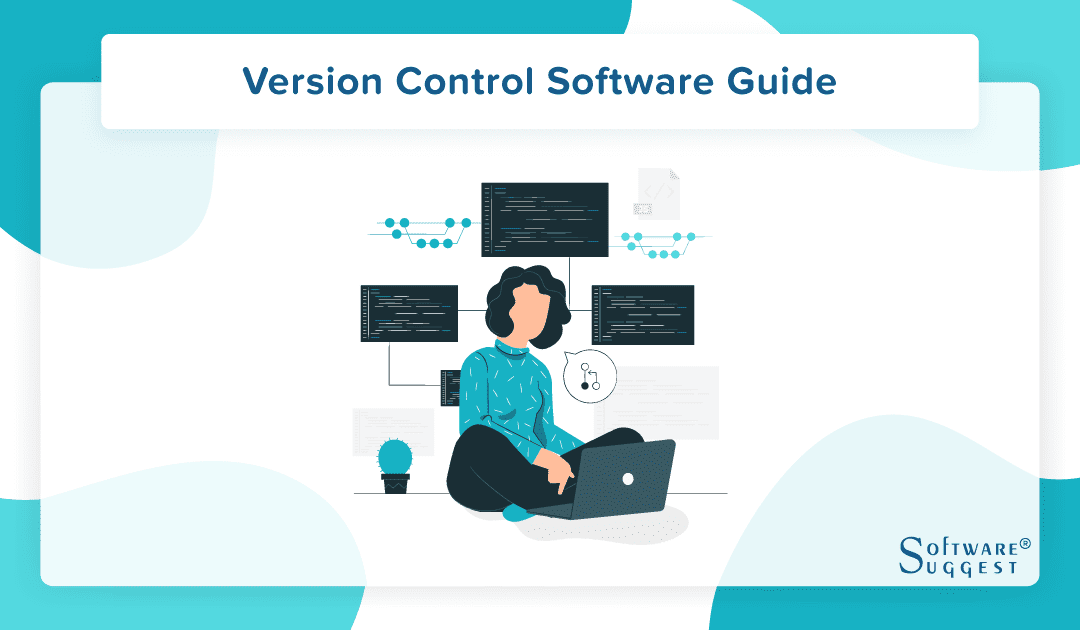
What is a Version Control System?
A version control system (VCS) is software for managing changes to source code over time. It stores every change to the code in a special database. If a mistake is made, developers can go back in time and compare earlier versions of the code to help fix the problem while minimizing disruption to all team members.
Why Do You Need a Version Control System?
The version control system is required to document changes in software code in a structured manner. The system keeps track of all changes made to the files. This documentation is extremely important, especially when there is an error in the new code or the updated code does not work as expected.
In such a scenario, developers can go back and compare the last working code to the latest code to see where it went wrong, or they can simply undo the changes.
A version control system is also required to help developers and programmers collaborate on a project. The system will allow everyone on these teams to access and review the data at the same time through branching & merging functionalities.
The team members will be able to access and update the code from any location at any time. Besides that, version control tools enable software teams to maintain efficiency and agility as the team grows in size.
The software version control systems will keep track of all changes made to the files. Typically, the changes are identified by a number or letter code, such as "revision 1." Each revision term includes a timestamp, the purpose behind the changes, the name of the person who made the change, etc.
The developer or programming team can compare, restore, and merge revisions as and when needed. In a nutshell, a version control system allows developers to restore a database to a previous version in the event of an error or when new code does not work as expected.
For all of these reasons, you need software version control systems!
What are the Different Types of Version Control Tools?
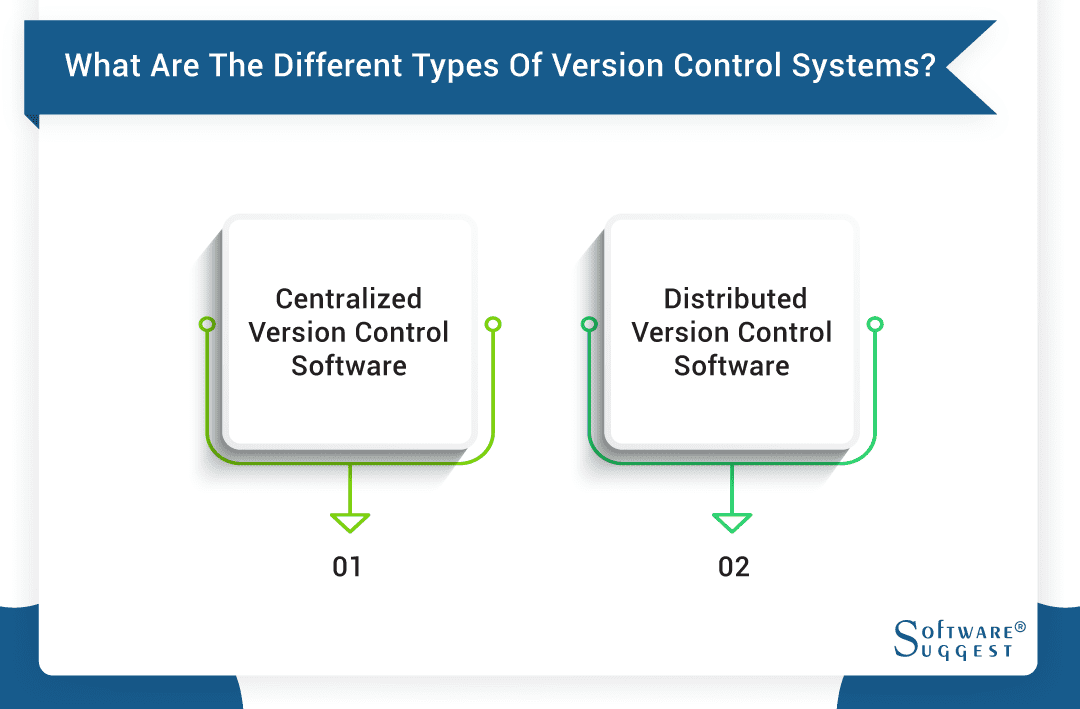
There are two types of version control tools: centralized version control software and distributed version control software. Let's take a quick look at each one.
1. Centralized Version Control Tools
Centralized version control software is a type of VCS tool in which there is only one copy of your data on the server. In other words, centralized VCS systems use a single server to store all relevant data and files. This means that any changes made to the files will be reflected in the central copy.
One of the major limitations of the centralized model is that if two developers try to change the same file at the same time, they may end up overwriting each other's work if access is not managed. Some of the most popular centralized version control systems are Subversion (SVN) and Perforce.
2. Distributed Version Control Tools
Distributed version control Tools is a type of software that allows you to keep track of all the versions of files in a project. Unlike the centralized version control system, you do not need to rely on a central server. Rather, it allows you to locally clone a copy of a repository so that you can see the entire history of the project.
Moreover, DVCS uses a peer-to-peer approach rather than the client-server approach used by centralized systems. This means that any changes you make to the files will not coincide with or conflict with changes made by another developer. Git and Mercurial are two of the most popular distributed version control systems.
How to Choose the Best Version Control Software?
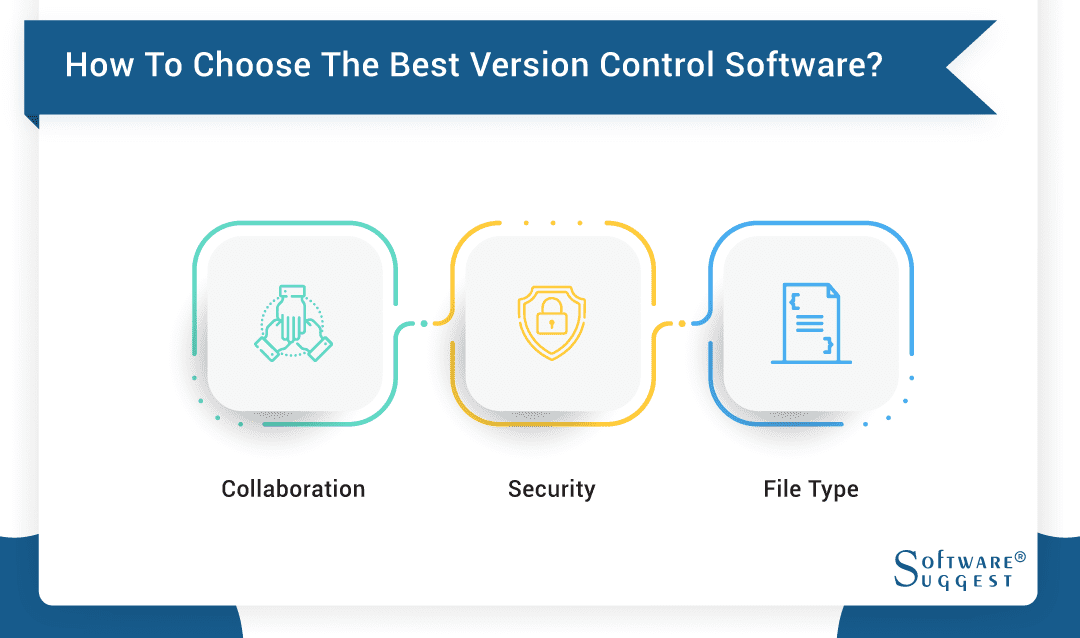
To find the best version control system, you must consider several factors, such as budget, security, collaboration, and others. Let's take a quick look at each of them.
1. Collaboration
The first thing to look for in version control software is how well it allows you to collaborate as a team and as individuals. Always go with a VCS tool that includes features like branching and merging. The advanced collaboration features will help you improve team agility, allowing you to accommodate new developers in the future easily.
2. Security
The next critical factor to consider when selecting the best version control system is security. For example, some developer teams require access down to the file level rather than just the repository or space. At the same time, there are developers teams who only need access to the repository. Choose the best version control software based on your needs.
3. File type
All version control tools are designed to handle various file types. For example, some version control platforms are better suited to handling large, binary files than others. So, if you are working on a project that requires a large number of binary files, you must pick version control software that is compatible with those files (e.g., graphic assets and text files).
Along with these three key factors, you should consider your team's expertise, budget, and other factors as well.
What are the Benefits of a Version Control System?
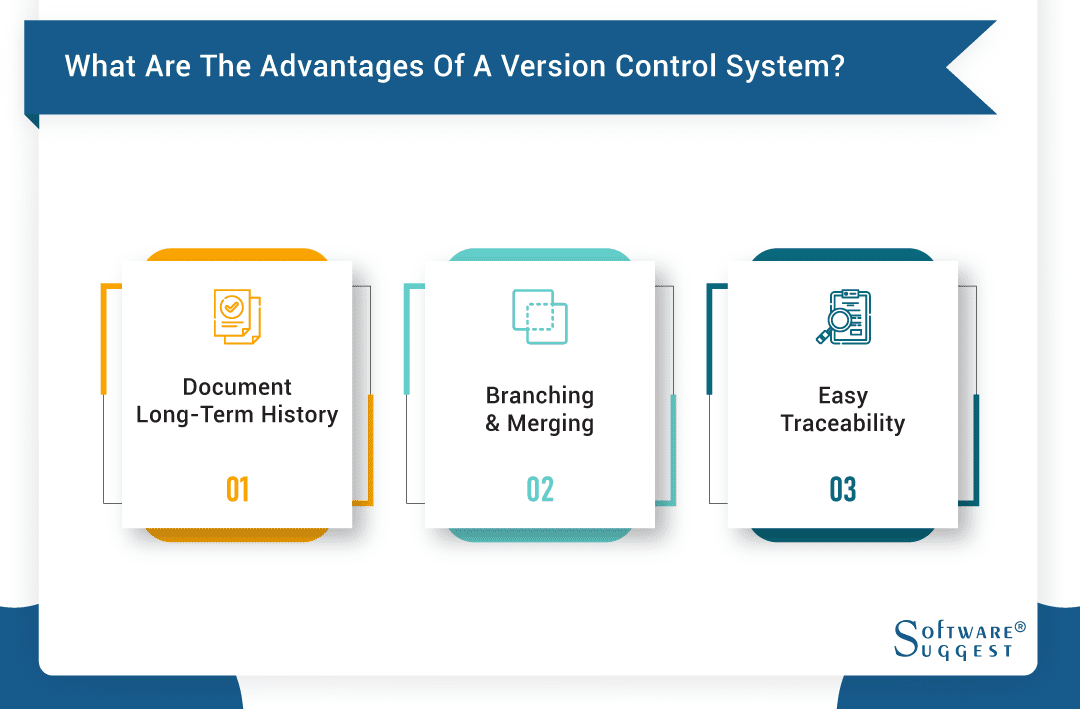
Version control software is a valuable asset to software development and DevOps teams. The three major benefits of version management tools are listed below.
1. Document Long-term History
The primary function of the version control system is to document every change made to the code by individuals over time. These modifications include the creation, editing, and deletion of files.
The software will save all versions along with all necessary information such as version name, author, date and time of change, and so on. This history documentation greatly aids in bug root cause analysis.
2. Branching & Merging
The next significant benefit of version management tools is branching and merging. Through 'branching,' the source control software allows multiple people to work on the same code at the same time.
The version control tools maintains multiple streams of work independent of one another through 'branching.' However, developers can merge all of the work back together. Besides that, they can also ensure that each branch does not conflict with one another.
3. Easy Traceability
Traceability refers to the ability to track each change made to the software and connect it to project management and bug-tracking software such as Jira. Developers can complete this task successfully with the help of a version control system.
Moreover, in the event of a software failure, they can annotate each change with its purpose during root cause analysis. This vital feature is especially useful when working with legacy code.
10 Best Version Control System
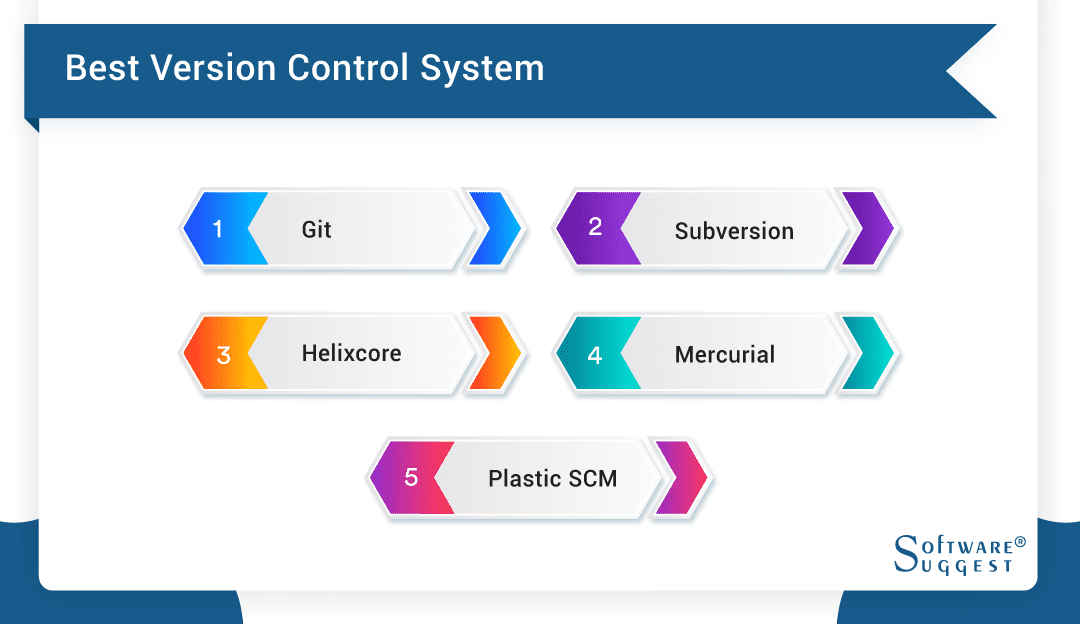
1. Top-Rated Version Control System for Your Project: Git
2. Best Version Control for System For Tracking Changes: Subversion
3. Best Version Control System for Small Use: Perforce Helix Core
4. Best Version Control System for Software Developers: Mercurial
5. Leading Version Control System for Team Collaboration: Plastic SCM
6. Best Version Control System in India: Jira
7. Best Version Control System for Your Management Need: BackUp Xplorer
8. Best Version Control System for Your Digital Assets: LogicalDOC
9. Best Version Control System for Your Documents: FogBugz Dev Hub
10. Best Version Control System for Securing Changes: LuitBiz DMS
1. Git Distributed Version Control System
Git is one of the best version control systems for managing everything from small to large projects quickly and efficiently. This version control tool records changes to a file or set of files over time so that you can recall specific versions later.
Not to mention, the Git system is quite simple to use and includes a number of advanced features that ensure the agility and security of databases, files, and code.
Git Features:
-
Branching & Merging
-
Data assurance
-
Frictionless context switching
-
Role-based code lines
-
Feature-based Workflow
Git Pricing:
Git is an open-source distributed version control system. This means you can use it for free.
2. Subversion Open Source Version Control System
Apache Subversion, also known as SVN, is a revision control software and code versioning system that allows software developers to maintain current and historical versions of files such as source code, web pages, and documentation.
Moreover, as a centralized system, SVN stores all files and historical data on a centralized server. Just like Git, Subversion (SVN) is also equipped with multiple features.
SVN Features:
-
Atomic commits
-
Complete revision history
-
File locking
-
Path-based authorization
-
Language binding
SVN Pricing:
Subversion is an open-source version control system that is free to use.
3. Perforce Helix Core Version Control Software
Perforce is one of the best version control tools for tracking, managing, and securing changes to all of your digital assets, including large binary files. This version control tool also enables software developers to track revisions of assets such as source code, graphics, movies, audio, and digital design files.
Moreover, using this VCS tool, developers can work on the same set of files without fear of duplicating effort or overwriting the work of other team members.
Perforce Features:
-
Concurrent development
-
Global collaboration
-
Immutable history records
-
Branching automation
-
Artifact management
Perforce Pricing:
Perforce does not provide pricing information for the Helix Core product. To get a customized pricing plan, contact the Helix Core sales team. However, note that the product is free for up to 5 users and 20 workspaces.
4. Mercurial Revision Control Software
Mercurial is a distributed revision control software for software developers that allows them to manage both text and binary files. The tool supports advanced branching and merging, as well as an integrated web interface.
Besides that, users can easily migrate from other VCS systems to Mercurial. Notably, despite being a command-line program, Mercurial also supports graphical user interface extensions.
Mercurial Features:
-
Handles projects of all size
-
Easy to learn
-
Robust file management
-
Advanced branching & merging
-
Integrated web-interface
Mercurial Pricing:
Mercurial is a free version control system.
5. Plastic SCM Version Control Software
Plastic SCM is a version control and source code management tool designed to improve team collaboration and engine scalability. The tool is primarily intended for small to medium-sized game studios.
It provides optimized workflows for artists and programmers, as well as superior performance when working with large files and binaries. Furthermore, Plastic SCM can be integrated with various engines, integrations, and DevOps apps such as JIRA, TeamCity, Jenkins, and others.
Plastic SCM Features:
-
Branching & Merging
-
Fully distributed VCS
-
Graphical UI & Visualization
-
Fast repository storage
-
Semantic version control
Plastic SCM Pricing:
Plastics SCM is available in three editions:
-
Free Cloud Edition: $0/Month, Up to three users
-
Cloud Edition: $7/User/Month
-
Enterprise Edition: $23/User/Month
FAQs
The most used version control softwares are Git, Subversion, Perforce, Mercurial and Plastic SCM.
Yes, Git can be considered one of the best version control software available in the market.
The revision control software keeps track of the changes made to a file or files over time. It stores semantic information about the version, such as the author, the date and time of the changes, and the purpose for the changes, among other things. These details can be accessed at any time for root cause analysis of the bugs.
The key difference between a version control system and a revision control system is that in revision control, the emphasis is on managing both changes and versions, whereas, in version control, the focus is solely on managing versions.



















